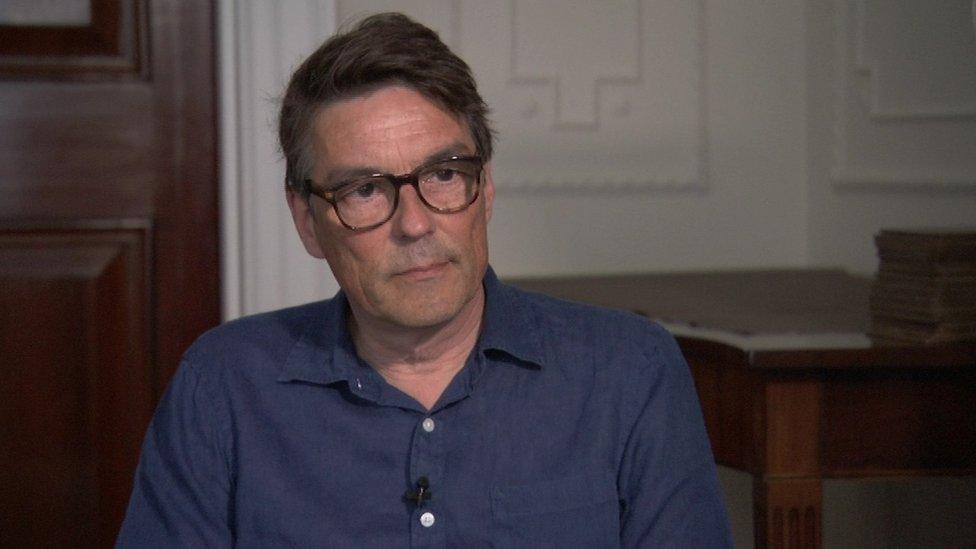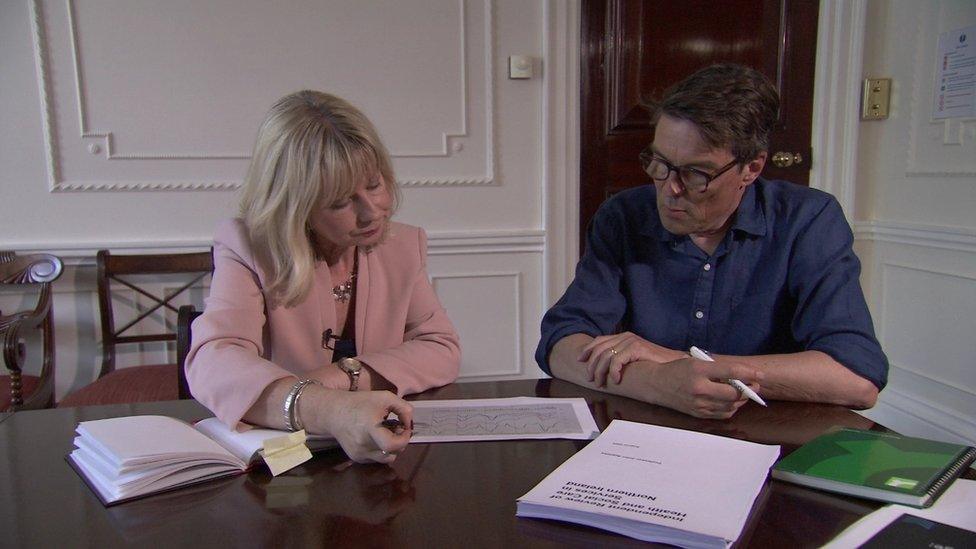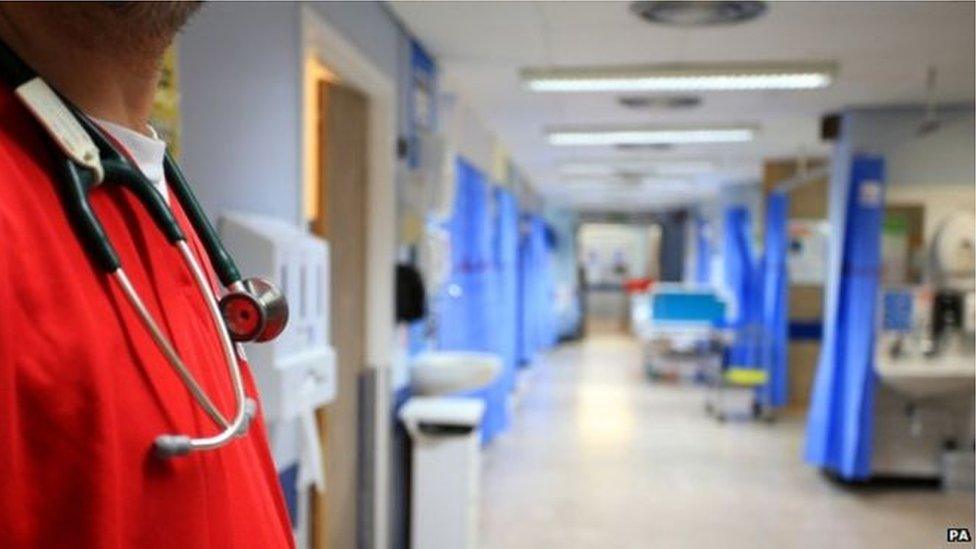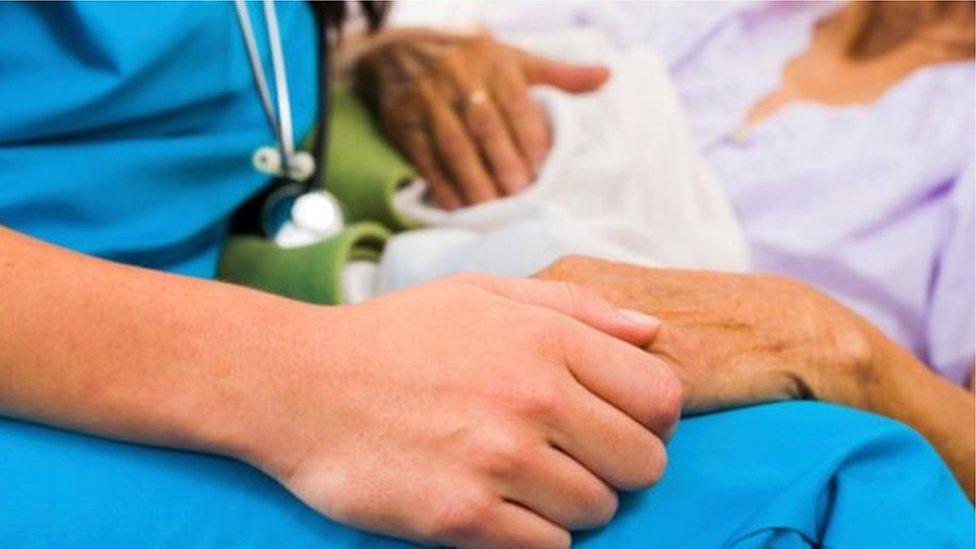'Unnecessary deaths' waiting lists warning
- Published

A leading health charity warned patients are 'suffering' because of treatment delays
Some people in Northern Ireland may die unnecessarily while remaining on a hospital waiting list for treatment, according to the national independent health charity, the Nuffield Trust.
Its chief economist has described Northern Ireland's hospital waiting list figures as shocking, unnecessary, unacceptable and the worst in the UK.
Meanwhile, the BBC understands that funding specifically targeted at health and waiting lists will feature heavily in the Conservative and DUP deal expected to be announced this week.
The Nuffield Trust is an independent health charity and advises governments not only in the UK but around the world on health economics.
The Health and Social Care Board (HSCB) said it was clear the current model of delivering services is not sustainable "given the continued increased demand".
"It is unacceptable that any patient has to wait longer than they should for assessment or treatment," it said in a statement.
'In pain'
Speaking to the BBC, the Nuffield Trust's chief economist, Prof John Appleby, asked if anyone actually cared about what is happening.
"There is no doubt that people are suffering," he said.
"I mean, economists like me talk about productivity and efficiency - what we really mean is not fixing the problem means people suffer.
"They wait too long, they are in pain, they may die on the waiting list when they needn't have to.

Prof John Appleby is the chief economist at the Nuffield Trust health charity in London
"So yes, the cost of not fixing the political problem, not fixing the management problem and so on, is that people are suffering."
Northern Ireland's hospital waiting list figures are the worst in the UK.
'Really shocked'
Last quarter's figures revealed that more people are waiting longer on a hospital outpatient appointment in Northern Ireland than ever before.
In fact, in just three months, the figure increased by 6,895.
Also, more than two thirds of patients were waiting longer than nine weeks - despite targets stating that at least 50% of patients should wait no longer than nine weeks.

NI waiting lists - the numbers:
70,000 patients are waiting on surgery, 30,000 in the Belfast health trust alone, according to the latest Department of Health figures
9,600 of these patients have already waited more than a year - 35% are orthopaedics patients
253,093 men and women are awaiting a first outpatient appointment with a consultant
That total is 17.6% more than this time last year
53,000 of them have already waited more than a year for a first outpatient appointment

There is growing concern that by the time the Northern Ireland Executive gets back up and running with a local health minister, the lists will have grown further.
According to Prof Appleby, the performance is unnecessary.
"I am really shocked," he said. "It is totally unacceptable in a health system in Northern Ireland to have the sort of numbers waiting as long as they wait."
"One in seven of the entire Northern Ireland population are on an outpatient waiting list. That's compared to England where it is one in 14.
"The fact that over 50,000 people are waiting over a year for an outpatient [appointment] again is very shocking.
"None of the waiting list targets are being met at the moment."

Prof Appleby told Marie-Louise Connolly NI waiting lists were 'totally unacceptable'
The HSCB said it welcomed the former health minister Michelle O'Neill's Elective Care Plan published in February.
"The plan sets out a commitment to reduce the backlog of patients waiting for elective care, subject to the availability of funding, while continuing the longer term process to transform secondary, primary and community care services to meet current and future demand," it said in a statement.
"The HSCB looks forward to working with the Department of Health, trusts and primary care in the future implementation of the plan."
Meanwhile, the BBC understands that an expected Conservative-DUP deal for Northern Ireland will target a substantial amount of money at the health service.
In both the DUP's and Sinn Féin's 2016 local election manifestos, £1bn was pledged towards health.
So, the figure from Downing Street could be somewhere in that region and would be a considerable investment, particularly if aimed at tackling the hospital waiting lists.
A source told the BBC that health and education have featured predominantly during negotiations, and that tackling waiting lists and school budgets would be seen as a massive plus for the DUP.
There is a possibility that the money - for instance the £1bn towards health and education - would not be conditional on how negotiations at Stormont play out.
'Frustrating'
While any cash injection - if it happens - will be welcomed, Northern Ireland's health service does not have the hospital space or staffing to deal with the issue in the short term.
However, sourcing some work to the independent sector could be a solution.
Senior managers will argue that while a one-off lump sum will work - what they need is longer-term recurrent funding in order to transform the service.
It remains unclear how a cash injection would shake down, particularly as using the Barnett formula - used to distribute UK wealth across Northern Ireland, Scotland, England and Wales - is unlikely, since Scotland and Wales would also have to have an equal spend.

Northern Ireland's hospital waiting list figures are the worst in the UK
Prof Appleby is among the many people who have carried out reviews of Northern Ireland's health service.
His first review was in 2005, followed by another in 2011.
He says he finds it massively frustrating that more reviews followed and very little has changed. He also believe additional cash is not necessarily the answer.
"Looking at the performance, it's hard not to come to the conclusion do the politicians really care?
"They've had numerous reports, all of which like mine have pointed out the same problems, the same poor performance and productivity.
"There needs to be leadership from the top on this."
- Published25 August 2016

- Published25 October 2016

- Published25 October 2016
